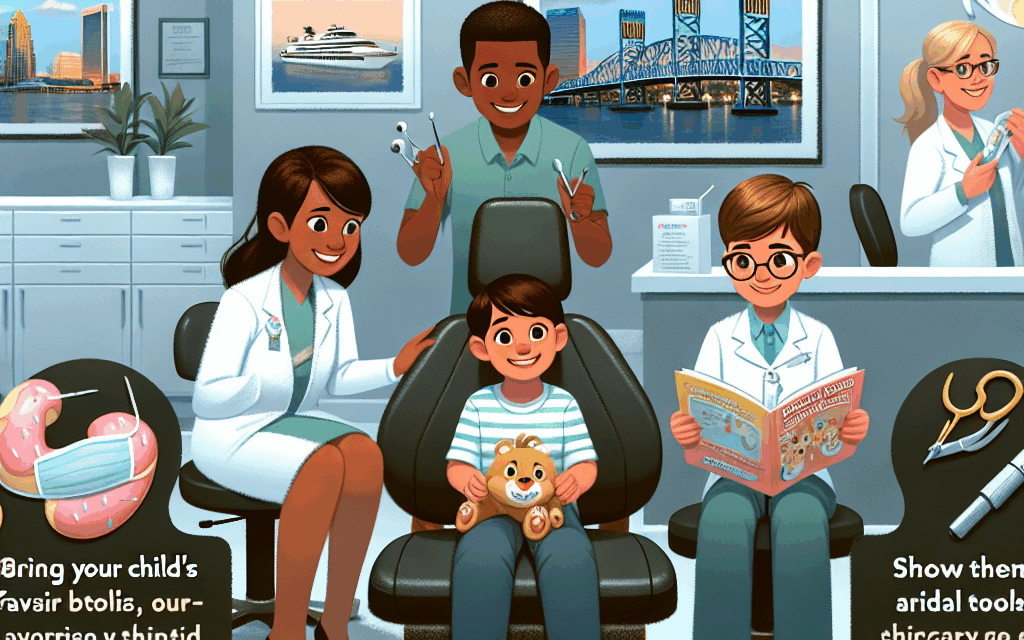Strategies to Alleviate Your Child’s Dental Anxiety in Jacksonville Clinics
Dental anxiety is a common issue among children, often stemming from fear of the unknown, past negative experiences, or even the sounds and smells associated with dental clinics. In Jacksonville, where dental health is a priority, it is essential for parents to equip themselves with effective strategies to help their children overcome this anxiety. This article explores various methods to alleviate dental anxiety in children, focusing on five key strategies: understanding the root causes, creating a positive dental environment, utilizing distraction techniques, employing behavioral management strategies, and fostering open communication.
Understanding the Root Causes of Dental Anxiety
Before addressing dental anxiety, it is crucial to understand its underlying causes. Children may experience anxiety for various reasons, including:
- Fear of Pain: Many children associate dental visits with pain, often due to previous experiences or stories from peers.
- Fear of the Unknown: The unfamiliar environment of a dental clinic, including the equipment and procedures, can be intimidating.
- Parental Anxiety: Children often pick up on their parents’ fears and anxieties, which can exacerbate their own feelings.
- Previous Negative Experiences: A bad experience at the dentist can lead to long-lasting fear and anxiety.
- Social Influences: Comments from friends or media portrayals of dental visits can shape a child’s perception.
Understanding these root causes is the first step in addressing dental anxiety. Parents can help their children by acknowledging these fears and discussing them openly. For instance, if a child is afraid of pain, parents can explain the steps the dentist will take to minimize discomfort, such as using numbing agents or gentle techniques. Additionally, parents should be mindful of their own attitudes towards dental visits, as their behavior can significantly influence their child’s feelings.
Creating a Positive Dental Environment
The environment of a dental clinic plays a significant role in a child’s comfort level. Jacksonville clinics are increasingly aware of the need to create a welcoming atmosphere for young patients. Here are some strategies that clinics can implement to foster a positive experience:
- Child-Friendly Decor: Clinics can use bright colors, fun artwork, and themed rooms to make the environment more inviting.
- Friendly Staff: Training staff to interact positively with children can help ease anxiety. A friendly smile and a gentle approach can make a significant difference.
- Waiting Room Activities: Providing toys, books, and games in the waiting area can distract children and make the experience more enjoyable.
- Parental Involvement: Allowing parents to accompany their children during procedures can provide comfort and reassurance.
- Positive Reinforcement: Offering small rewards, such as stickers or toys, after a successful visit can create positive associations with dental care.
For example, a Jacksonville clinic might have a “superhero” theme, where children can choose capes to wear during their visit. This not only makes the experience fun but also empowers children to feel brave. By creating a positive dental environment, clinics can significantly reduce anxiety levels in young patients.
Utilizing Distraction Techniques
Distraction techniques can be highly effective in alleviating dental anxiety. By redirecting a child’s focus away from the dental procedure, parents and dental professionals can help reduce fear and discomfort. Here are some effective distraction strategies:
- Visual Distractions: Using colorful posters, videos, or even virtual reality headsets can engage a child’s attention during treatment.
- Auditory Distractions: Playing calming music or allowing children to listen to their favorite songs through headphones can help create a soothing atmosphere.
- Interactive Distractions: Providing handheld games or tablets can keep children occupied while they wait or during procedures.
- Breathing Exercises: Teaching children simple breathing techniques can help them relax and focus on something other than their anxiety.
- Storytelling: Engaging children in a story or allowing them to tell their own can transport them to a different world, reducing their focus on the dental visit.
For instance, a dental clinic in Jacksonville might implement a “movie day” where children can watch their favorite films while receiving treatment. This not only distracts them but also makes the experience more enjoyable. By utilizing distraction techniques, parents and dental professionals can create a more relaxed environment for children undergoing dental procedures.
Employing Behavioral Management Strategies
Behavioral management strategies are essential tools for dental professionals when working with anxious children. These techniques can help children feel more in control and less fearful during their dental visits. Some effective behavioral management strategies include:
- Positive Reinforcement: Praising children for their bravery and cooperation can encourage them to continue exhibiting positive behavior during future visits.
- Desensitization: Gradually exposing children to the dental environment can help them become more comfortable over time. This might involve short visits to the clinic without any procedures being performed.
- Role-Playing: Allowing children to role-play as the dentist or patient can help them understand what to expect during their visit, reducing fear of the unknown.
- Setting Clear Expectations: Explaining what will happen during the visit in simple, age-appropriate language can help children feel more prepared and less anxious.
- Using Comfort Items: Allowing children to bring a favorite toy or blanket can provide a sense of security during their visit.
For example, a Jacksonville dentist might implement a desensitization program where children visit the clinic multiple times before their actual appointment. During these visits, they can meet the staff, explore the office, and even sit in the dental chair without any procedures being performed. This gradual exposure can significantly reduce anxiety and help children feel more comfortable when it’s time for their actual appointment.
Fostering Open Communication
Open communication between parents, children, and dental professionals is vital in alleviating dental anxiety. By fostering an environment where children feel safe to express their fears and concerns, parents can help them navigate their anxiety more effectively. Here are some strategies for promoting open communication:
- Encouraging Questions: Parents should encourage their children to ask questions about the dental visit, helping them feel more informed and less anxious.
- Active Listening: Parents should listen to their children’s concerns without judgment, validating their feelings and providing reassurance.
- Using Positive Language: Parents should use positive language when discussing dental visits, framing them as a routine part of health care rather than something to fear.
- Sharing Personal Experiences: Parents can share their own positive dental experiences to help normalize the visit and reduce fear.
- Collaborating with Dental Professionals: Parents should communicate openly with dental staff about their child’s anxiety, allowing for tailored approaches to care.
For instance, a parent might sit down with their child before a dental appointment and discuss what will happen during the visit. They could explain the tools the dentist will use and reassure the child that they will be there for support. By fostering open communication, parents can help their children feel more empowered and less anxious about their dental visits.
Conclusion
Dental anxiety is a common challenge faced by many children, but it is not insurmountable. By understanding the root causes of anxiety, creating a positive dental environment, utilizing distraction techniques, employing behavioral management strategies, and fostering open communication, parents can significantly alleviate their child’s fears. Jacksonville clinics are increasingly adopting these strategies to ensure that young patients have a positive experience during their dental visits.
Ultimately, the goal is to instill a sense of confidence and comfort in children regarding their dental health. By equipping them with the tools to manage their anxiety, parents can help their children develop a lifelong positive attitude towards dental care. As a result, children will be more likely to maintain regular dental visits, leading to better oral health outcomes in the long run.
In summary, addressing dental anxiety requires a multifaceted approach that involves collaboration between parents, children, and dental professionals. By implementing these strategies, families in Jacksonville can work together to create a supportive and reassuring environment that promotes positive dental experiences for children.





